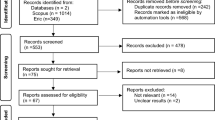Abstract
In Cyprus, the pilot programme for the introduction of Information and Communication Technology (ICT) in elementary schools aimed at ICT as a cross-curricular tool and involved a combination of centralised initiative and largely decentralised implementation responsibility. Two independent studies on curricula integration indicated that parents' and teachers' preferred models as well as teachers' applied models vary widely. These models range from the technocentric (applying ICT as a discrete subject) to the humanistic curriculum (using ICT as a cross-curricular tool). The findings indicate that the challenge is on the policy makers to decide which model to adopt so as to specify the role of ICT in the National Curriculum and to create an appropriate infrastructure to support the model adopted.
Similar content being viewed by others
References
Benzie, D. (1997) Information technology capability: Is our definition wide of the mark? In Information Technology Supporting Change through Teacher Education, D. Passey and B. Samways (eds). IFIP and Chapman and Hall, London.
Blenkin, G., Edwards, G., and Kelly, A. (1992) Change and the Curriculum. Paul Chapman, London.
Cerych, L. and Jallade, J. P. (1986) The coming technological revolution in education: A report on the potential and limitations of new media and information technologies in education. European Institute of Education and Social Policy, Paris.
Charalambous, K. (2001) An investigation of the provision of information technology in-service education and training for Cypriot primary teachers. Ph.D. thesis, School of Education, University of Birmingham.
Cox, M. (1997) Identification of the changes in attitude and pedagogical practices needed to enable teachers to use information technology in the school curriculum. In Information Technology Supporting Change through Teacher Education, D. Passey and B. Samways (eds). IFIP and Chapman and Hall, London.
Dertouzos, M. L. (1989) Made in America. The MIT Press, Cambridge.
Drenoyianni, H. and Selwood, I. (1998) Conceptions or misconceptions? Primary teachers' perceptions and use of computers in the classroom. Education and Information Technologies, 3, 87–99.
Education Review Office. (2001) The Implementation of Information and Communication Technologies (ICT) in New Zealand Schools. Retrieved October 18, 2002 from http://www.ero.govt.nz/Publications/pubs2001/ ICT%202001.htm
European Commission (2001) ICT@Europe.edu. Directorate-General for Education and Culture/Eurydice, Brussels.
Fullan, M. (1982) The Meaning of Educational Change. Teachers College Press, New York.
Fullan, M. (1992) Successful School Improvement. Open University Press, Buckingham.
Hickey, G. (1993) Computer use in elementary classrooms: An ethnographic study. Journal of Computing in Childhood Education, 4(3), 219–228.
Karagiorgi, Y. (2000) The introduction of educational technology into elementary schools in Cyprus: A critical analysis of the implementation of an innovation. Ph.D. thesis, Institute of Education, University of London.
Knight, B. A. and Knight, C. (1995) Cognitive theory and the use of computers in primary classroom. British Journal of Educational Technology, 26(2), 141–148.
Leventhall, S., Stevens, P., and Melton, M. (1993) Managing Data Daemons: Rethinking the Roles of Technology in Education. The University of Texas at Austin, Cambridge.
McKinsey and Company (1997) The Future of Information Technology in UK Schools. McKinsey and Company, London.
Naisbitt, J. (1984) Megatrends. MacDonald & Co, London.
NCET (1995) Approaches to IT Capability: Key Stage 3. NCET, Coventry.
Nicholson, P. (1995) A curriculum for teachers or for learning? In Integrating Information Technology into Education, D. Watson and D. Tinsley (eds). IFIP and Chapman and Hall, London.
Nishinosono, H. (1989) The use of new technology in education: Evaluating the experience of Japan and other Asian countries. In New Educational Technologies, X. Greffe and H. Nishinosono (eds). UNESCO, Paris.
Passey, D. and Ridgway, J. (1992) Co-ordinating National Curriculum Information Technology: Strategies for Whole School Development. Framework Press.
Pelgrum, W. J. and Plomp, T. (1993) The IEA Study of Computers in Education: Implementation of an Innovation in 21 Educational Systems. Pergamon Press, Oxford.
Persianis, P. (1991) Meletes kai dokimia gia tin ekpaidefsi tis Kyprou (Studies and Essays on the Education of Cyprus). Pedagogical Institute, Nicosia.
Ridgway, J. (1997) Vygotsky, informatics capability and professional development. In Information Technology Supporting Change through Teacher Education, D. Passey and B. Samways (eds). IFIP and Chapman and Hall, London.
Roblyer, M. D. and Edwards, J. (2000) Integrating Educational Technology into Teaching. Prentice-Hall, New Jersey.
Tagg, B. (1995) The impact of government initiatives on IT education in UK schools. Computer Education, 81, 5–9.
Tweddle, S. (1993) The future curriculum and information technology. Journal of Information Technology for Teacher Education, 2(2), 105–110.
UNESCO (1998) World education report: Teachers and teaching in a changing world. UNESCO, Paris.
Veen, W., Hogenbirk, P., and Jansen, F. (1995) The implementation of communication and information technologies in teacher education in the Netherlands. In Information Technologies in Teacher Education: Issues and Experiences for Countries in Transition, B. Collis, I. Nikolova, and K. Martcheva (eds). UNESCO, France.
Venezky, R. and Davis, C. (2002) Quo Vademus? The Transformation of Schooling in a Networked World. OECD/CERI.
Watson, D. (1997) A dichotomy of purpose: The effect on teachers of government initiatives in information technology. In Information Technology Supporting Change through Teacher Education, D. Passey and B. Samways (eds). IFIP and Chapman and Hall, London.
Author information
Authors and Affiliations
Rights and permissions
About this article
Cite this article
Karagiorgi, Y., Charalambous, K. Curricula Considerations in ICT Integration: Models and Practices in Cyprus. Education and Information Technologies 9, 21–35 (2004). https://doi.org/10.1023/B:EAIT.0000024259.91951.44
Issue Date:
DOI: https://doi.org/10.1023/B:EAIT.0000024259.91951.44




